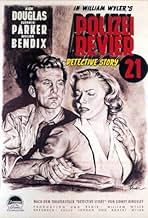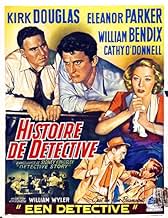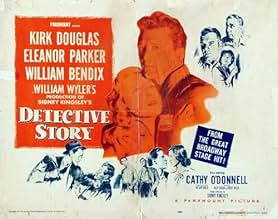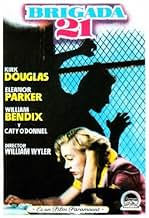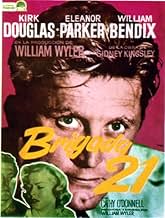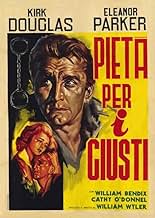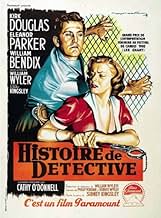IMDb RATING
7.5/10
9.9K
YOUR RATING
On one day in the 21st Precinct squad room, assorted characters form a backdrop for the troubles of hard-nosed Detective Jim McLeod.On one day in the 21st Precinct squad room, assorted characters form a backdrop for the troubles of hard-nosed Detective Jim McLeod.On one day in the 21st Precinct squad room, assorted characters form a backdrop for the troubles of hard-nosed Detective Jim McLeod.
- Director
- Writers
- Stars
- Nominated for 4 Oscars
- 7 wins & 11 nominations total
William 'Bill' Phillips
- Det. Pat Callahan
- (as William 'Bill' Phillips)
- Director
- Writers
- All cast & crew
- Production, box office & more at IMDbPro
Featured reviews
A play which tells the story of a day in the lives of the several people who populate a police precinct translates more or less transparently between mediums, though with its theatrical pace results in a vigorous, enthralling drama with a solid, receptive cast. Kirk Douglas, playing the central cop, a brooding maverick who can't stand having to stop at the line between law and vengeance, is very intense in particular, the breadth of view of a crystallizing soul masqueraded by rigor and command, which makes for some delicate scenes with his wife, Eleanor Parker. The very natural William Bendix is one of the other officers in the precinct, a cop with a delicate sensibility, the clear contrast to the uncompromising protagonist. But the film's brightest highlights are the few moments dominated by the brilliant Lee Grant, whose character seems non-sequitary yet has a refreshing outside-world quality. Dense with lively exhibitions of the sort of devil-may-care influx that transits and languishes through a workday of plainclothes detectives, it is a police procedural not in the traditional sense. There is no central case over which our detectives toil. There is simply an allotment of arrests and conflicting views on the confines of police work.
While this Edgar-winning cop drama stays in effect a filmed play, William Wyler uses the innate limitations of such a project as a creative outlet, as well as his widely known grating approach multiple retakes. The cooped up setting is not just a space where all manner of characters eyeball each other and interplay. It complements the lurking gist of the story's thematic elements and overall to the film's dramatic impact. The staging of the individual scenes, which a lot of the time plays on foreground-background relationships, is intensified by Lee Garmes's deep-focus cinematography, a consistent device used by Wyler throughout his body of work no matter how much he diversifies in genre and tone.
The core of Wyler's consistency throughout his tremendous career is his insistence on emotional truth, thus his enraging approach to directing actors, and thus his track record with directing Oscar-nominated and Oscar-winning performances. Wyler's discretion of angle exposes or intimates more character than the last and apprehends the decisive sensibility to give significance to the experience of seeing the film. He didn't coin anything new. He didn't use unprecedented angles or logistically fussy dolly takes. He's discerning from the acknowledged bill of fare of long shot, medium shot and close-up as the atmosphere of the scene calls for.
While this Edgar-winning cop drama stays in effect a filmed play, William Wyler uses the innate limitations of such a project as a creative outlet, as well as his widely known grating approach multiple retakes. The cooped up setting is not just a space where all manner of characters eyeball each other and interplay. It complements the lurking gist of the story's thematic elements and overall to the film's dramatic impact. The staging of the individual scenes, which a lot of the time plays on foreground-background relationships, is intensified by Lee Garmes's deep-focus cinematography, a consistent device used by Wyler throughout his body of work no matter how much he diversifies in genre and tone.
The core of Wyler's consistency throughout his tremendous career is his insistence on emotional truth, thus his enraging approach to directing actors, and thus his track record with directing Oscar-nominated and Oscar-winning performances. Wyler's discretion of angle exposes or intimates more character than the last and apprehends the decisive sensibility to give significance to the experience of seeing the film. He didn't coin anything new. He didn't use unprecedented angles or logistically fussy dolly takes. He's discerning from the acknowledged bill of fare of long shot, medium shot and close-up as the atmosphere of the scene calls for.
Kirk Douglas has always excelled in roles where he plays the maverick loner, walking the fine line between anger and insanity. Thus his role as Det. Jim McLeod in "Detective Story" is a real showcase for his acting talents. This is not a crime drama in the conventional sense where there is any real action or crime to solve, even though you have a room full of New York City police detectives on screen for just about the whole movie. Instead it is a character study of Jim McLeod, played by Kirk Douglas. McLeod's motivation in his work is not to solve crimes or even protect the innocent. Instead, he is motivated by a desire to root out evil by his definition of the word. Evil is something McLeod claims that anyone can easily spot. McLeod's world view doesn't differentiate between the one-time bad act of a basically good person, such as Arthur Kindred (Craig Hill), a young man who impulsively stole from his employer in a last ditch attempt to impress a girl he believed he loved, versus the misdeeds of a lifetime criminal, such as the homicidal maniac Charlie (Arthur Kindred), that has also been apprehended by the detective squad that same day.
When confronted by a mistake in the past of the person nearest to him, his own wife, McLeod is equally unforgiving. His rage and disgust is so great, you're not sure what bothers him more - the discovery of his wife's past or the failure of his own nose to sniff out the misdeed prior to this. By the time McLeod realizes his own inflexibility and lack of empathy have cost him what he loves the most, it is too late to undo the damage, and this leads to one last tragedy.
This is Douglas in an early fine if not huggable role, and is recommended viewing for that reason alone. William Bendix makes up for the lack of likability in Douglas' character as Detective Lou Brady, who likes to temper the letter of the law with a little humanity. Then there's a very young Lee Grant as a shoplifter who just can't stop babbling. Finally, there's Horace McMahon as Lieutenant Monaghan, head of the detective squad and the kind of boss we'd all like to have.
When confronted by a mistake in the past of the person nearest to him, his own wife, McLeod is equally unforgiving. His rage and disgust is so great, you're not sure what bothers him more - the discovery of his wife's past or the failure of his own nose to sniff out the misdeed prior to this. By the time McLeod realizes his own inflexibility and lack of empathy have cost him what he loves the most, it is too late to undo the damage, and this leads to one last tragedy.
This is Douglas in an early fine if not huggable role, and is recommended viewing for that reason alone. William Bendix makes up for the lack of likability in Douglas' character as Detective Lou Brady, who likes to temper the letter of the law with a little humanity. Then there's a very young Lee Grant as a shoplifter who just can't stop babbling. Finally, there's Horace McMahon as Lieutenant Monaghan, head of the detective squad and the kind of boss we'd all like to have.
Some films are so full of life they have to be seen again and again. I first saw this one in my early teens and loved it, despite difficulty in understanding it. Decades later I still love it, and always will. It has its flaws: everybody overacts (beautifully), as if on stage. The writing is a bit too well-structured, almost like clockwork, the characters are a bit too symbolic and easy to categorise. The comic relief kicks in just on schedule. The psychological diagnosis is too precise. And yet, this is one of the greatest films ever made. It has a sense of respect for the totality of life, and makes tragedy almost poetic. Fascinating though the plot may be, the essence of this film goes beyond plot. It's a symphony of cacophony. The playwright would have made a fine composer.
Detective Story (1951)
**** (out of 4)
William Wyler's brilliant drama about a police detective (Kirk Douglas) who breaks his back trying to put criminals behind bars but there's a secret from his wife that's going to toss all his beliefs in the air. The last time I watched this film was when I was around eleven years old and it left a vivid aftertaste in my mouth after all these years. At the time I was just expecting another "old, dated" film but the realistic nature of this film remains quite powerful and very brutal even in today's jaded world. The entire cast delivers strong performances from the lead Douglas to the smallest of parts in the film. These performances certainly help the film seem all the more real, which is an added bonus. The best performance is of course the one by Douglas who brings all that energy and power to the film. Watching his character slowly breakdown and eventually lose it is something hard to forget.
**** (out of 4)
William Wyler's brilliant drama about a police detective (Kirk Douglas) who breaks his back trying to put criminals behind bars but there's a secret from his wife that's going to toss all his beliefs in the air. The last time I watched this film was when I was around eleven years old and it left a vivid aftertaste in my mouth after all these years. At the time I was just expecting another "old, dated" film but the realistic nature of this film remains quite powerful and very brutal even in today's jaded world. The entire cast delivers strong performances from the lead Douglas to the smallest of parts in the film. These performances certainly help the film seem all the more real, which is an added bonus. The best performance is of course the one by Douglas who brings all that energy and power to the film. Watching his character slowly breakdown and eventually lose it is something hard to forget.
William Wyler, who won three Oscars for Best Director ("Mrs. Miniver", "The Best Years of Our Lives", "Ben-Hur"), and been nominated a record 12 times between 1937 and 1966, is not often thought of as one of our "great" directors. Truly, he was. Here, with the filmization of Sidney Kingsley's stage play about a NYC police station, focusing on the amazingly bad day which has been happening to Detective Kirk Douglas, Wyler shows his skill and diversity.
Kirk Douglas is the vision of a crumbling spirit disguised by toughness and authority. He towers over a stellar cast, including Eleanor Parker as his wife, William Bendix as one of the other officers in the precinct, and Lee Grant as an inexperienced shoplifter. The one actor who truly stands out from the rest is Joseph Wiseman, who is simply a spark plug made up as an actor, giving an astounding recreation of his stage role as an on-edge, cheap suit-wearing thief. He displays the physical dexterity of James Cagney in the physique of a beanstalk, and proves to be more dangerous than any other movie crook we'd seen in the past.
In one of the great Oscar follies of our time (and there were many), the 1952 voters neglected to nominate Douglas as Best Actor, or Wiseman in a supporting slot. Nominations were given out for Wyler's direction, the screenplay, and for Parker and Grant, lead and supporting actresses respectively. None for Best Picture, the other nominations were passed over in favor of "A Place in the Sun" and "A Streetcar Named Desire". And who was picked for Best Picture? Well, staying true to AMPAS's mission of picking only the most harmless movie of the year ("Driving Miss Daisy", "Chariots of Fire", "Shakespeare in Love"), instead of the best, they picked "An American in Paris", which will be remembered by film historians as merely a rehearsal for "Singin' in the Rain". Oh, well.
Kirk Douglas is the vision of a crumbling spirit disguised by toughness and authority. He towers over a stellar cast, including Eleanor Parker as his wife, William Bendix as one of the other officers in the precinct, and Lee Grant as an inexperienced shoplifter. The one actor who truly stands out from the rest is Joseph Wiseman, who is simply a spark plug made up as an actor, giving an astounding recreation of his stage role as an on-edge, cheap suit-wearing thief. He displays the physical dexterity of James Cagney in the physique of a beanstalk, and proves to be more dangerous than any other movie crook we'd seen in the past.
In one of the great Oscar follies of our time (and there were many), the 1952 voters neglected to nominate Douglas as Best Actor, or Wiseman in a supporting slot. Nominations were given out for Wyler's direction, the screenplay, and for Parker and Grant, lead and supporting actresses respectively. None for Best Picture, the other nominations were passed over in favor of "A Place in the Sun" and "A Streetcar Named Desire". And who was picked for Best Picture? Well, staying true to AMPAS's mission of picking only the most harmless movie of the year ("Driving Miss Daisy", "Chariots of Fire", "Shakespeare in Love"), instead of the best, they picked "An American in Paris", which will be remembered by film historians as merely a rehearsal for "Singin' in the Rain". Oh, well.
Did you know
- GoofsIn some of the close-up shots of McLeod and Schneider in the back of the paddy wagon, McLeod's shadow can be faintly seen on the rear-projection screen showing the street behind them. (Other shadows can also be seen.)
- Quotes
Detective James McLeod: I built my whole life on hating my father. All the time he was inside me, laughing.
- ConnectionsFeatured in Paramount Presents (1974)
- How long is Detective Story?Powered by Alexa
Details
- Runtime1 hour 43 minutes
- Color
- Aspect ratio
- 1.37 : 1
Contribute to this page
Suggest an edit or add missing content



